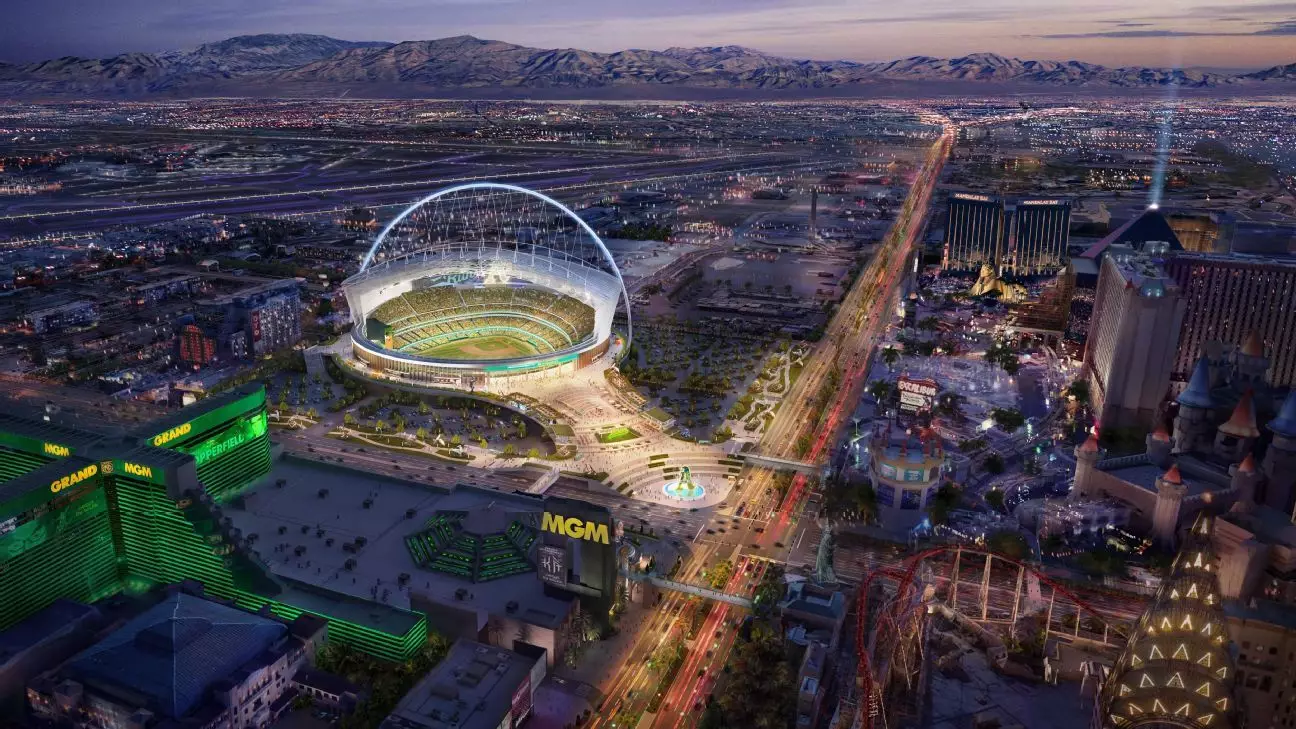In a groundbreaking move that positions Las Vegas at the forefront of the sports industry, the Las Vegas Stadium Authority has granted approval for a pivotal lease and non-relocation agreements regarding the Oakland Athletics’ ambitious plan to construct a state-of-the-art $1.75 billion stadium on the iconic Strip. The announcement, celebrated by local officials and the franchise alike, signifies an important step toward bringing Major League Baseball (MLB) to a city that is steadily expanding its sports offerings. This decisive moment marks a new chapter not just for the Athletics but for the burgeoning sports culture in Las Vegas.
Steve Hill, the CEO of the Las Vegas Convention and Visitors Authority, expressed a collective sentiment of optimism, stating, “It’s a really significant day in Las Vegas.” His comments echoed the enthusiasm surrounding the project, and many in attendance responded with applause, illustrating the community’s excitement about the development. As Hill noted, this moment represents a major milestone in the city’s quest for sports-centric growth, highlighting the importance of collaboration between local authorities and sports franchises.
While the approval is a monumental achievement, it is not without challenges. The intricacies of the development agreement with Clark County are still in the early negotiation stages, although ground is expected to break in the spring, with hopes of completing the stadium in time for the 2028 MLB season. Sandy Dean, a member of the team’s board, emphasized the A’s gratitude for the support received thus far, hinting at an optimistic path ahead, despite potential hurdles.
One key aspect of this large-scale project is the significant financial implications. The price tag for constructing the stadium has escalated by $250 million due to inflation and additional amenities planned to enhance the fan experience, such as an innovative under-seat cooling system and a unique split lower bowl design. This escalated cost underscores the complexities involved in modern stadium construction and public-private financing, which are increasingly susceptible to economic fluctuations such as rising interest rates and construction material costs.
Public Funding and Investment Strategies
The pursuit of funding has drawn significant attention, with Nevada and Clark County committing $380 million from public funds to help realize the project. However, public financing will commence only once the A’s have invested $100 million of their own. So far, the franchise has initiated substantial financial commitments, contributing $40 million towards the initiative. Club owner John Fisher has also ramped up personal financial backing, pledging $1.1 billion from his family’s resources to ensure the operational and construction costs are met.
Moreover, the team has secured a $300 million loan from prominent financial institutions like U.S. Bank and Goldman Sachs, solidifying the necessary financial infrastructure to support the venture. Although the team is actively seeking investors to purchase equity and bolster its financial portfolio, Hill assured the board that all overages would rest with the Athletics, establishing a foundation of accountability and fiscal responsibility.
To ensure stakeholders of the viability of this ambitious undertaking, the Stadium Authority organized a comprehensive review of Fisher’s financial status. Financial experts from U.S. Bank collaborated to verify that Fisher possesses assets sufficient to cover the equity stake required for the construction of the ballpark. Underpinned by thorough analysis and detailed financial documents, including brokerage statements and SEC filings, their findings provide a robust assurance of the A’s economic stability and capacity to navigate the project.
With the approval of the Stadium Authority, the A’s are preparing to transition from their West Sacramento minor league home, where they will remain for at least three seasons, to what promises to be one of the premier venues in Major League Baseball. This transition not only signifies a new home for the franchise but also the potential for Las Vegas to become the nexus of professional sports, alongside established teams like the NFL’s Raiders and NHL’s Golden Knights.
A Thriving Sports Community
Las Vegas is swiftly becoming a prominent player in the professional sports landscape, with the Athletics set to join an elite roster that includes the NFL and NHL teams, as well as the WNBA’s Aces. This expansion signifies a watershed moment for the gambling capital of the world, transforming it into a legitimate contender for hosting major sports franchises. As the city’s sports community thrives, local residents and tourists alike can anticipate exciting developments ahead, coupled with a burgeoning sense of pride as the city embraces its identity as a sports destination.
With the recent announcement of free-agent pitcher Luis Severino signing a historic contract with the A’s, valued at $67 million over three years, the future looks encouraging for fans and stakeholders. This commitment to enhancing team performance alongside infrastructural growth reinforces the organization’s ambition to not only succeed on the field but to create a lasting impact in Las Vegas’s cultural and economic landscape. With every passing milestone, the Athletic’s journey marks a pivotal moment for baseball and sports in general within an evolving marketplace.


Leave a Reply